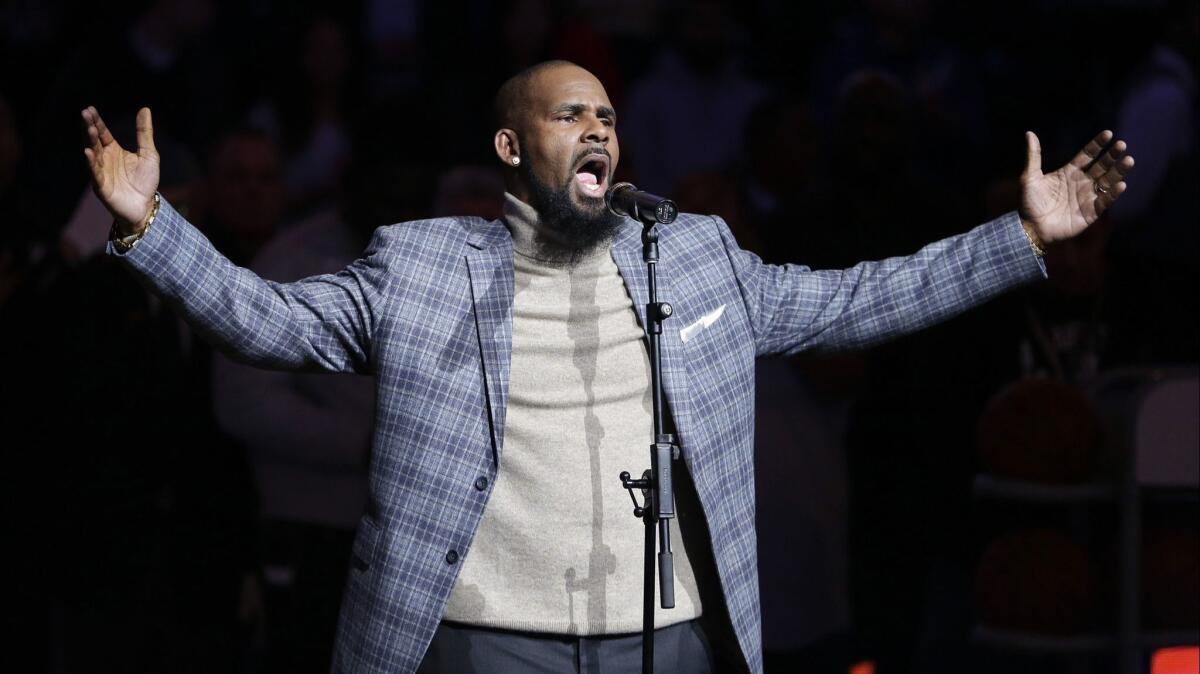Review: ‘Surviving R. Kelly’ explores decades of alleged sexual abuse by the singer and an industry’s complicity

Lifetime’s powerful documentary series “Surviving R. Kelly” isn’t over yet, but the six-part special has already made an impact and put several prominent music artists on the defensive.
The series features firsthand accounts, police investigations, court documents and more to chronicle the “I Believe I Can Fly” singer’s increasingly disturbing pattern of alleged sexual, mental and physical abuse of underage girls over two decades. Women who fell under Kelly’s spell, some who were as young as 13, speak out for the first time here, illustrating the dark side of fame, the perils of celebrity worship and double standards when it comes to race in the #MeToo era.
But artists such as Questlove and Jay-Z reportedly declined to be interviewed for this series, and are now being called out across media platforms for continuing to give the R&B superstar a pass.
The series’ executive producer Dream Hampton was recently quoted saying that nearly every artist she approached for the series — Lady Gaga, Dave Chappelle, Erykah Badu, Celine Dion — declined to be interviewed. Now many of them are now being criticized for it. (Gaga worked with Kelly as recently as 2013, and so did Jay-Z.) Questlove defended himself on Twitter before deleting his post.
John Legend is the only high-profile artist who appears in the production: “To everyone telling me how courageous I am for appearing in the doc, it didn’t feel risky at all,” he tweeted.
The reaction to the series says as much about pop music’s inherent misogyny as the documentary itself. The record business still views young women as acceptable collateral damage in the fame game. And when it comes to the targeting of young African American women (Kelly’s alleged prime targets), such exploitation is encouraged in video after video, lyric after lyric.
In-depth interviews with alleged victims, Kelly’s ex-wife, his brothers, former insiders, friends, and journalists who’ve covered the Chicago songwriter and producer paint a picture of a predator whose behavior was consistently overlooked by the industry, his peers and the public while his spiritual hit was sung in churches and schools.
“Surviving R. Kelly” revisits Kelly’s early-90s relationship with late singer Aaliyah, who met him when she was 12. He produced her album, “Age Ain’t Nothing But a Number.” In the title song, she sings about trying to get an older guy to have sex with her. “It’s a perfect song for hiding in plain sight,” says cultural critic Touré. Believing she was pregnant, Kelly married her. He was 28, she was 15. The union made news, and was annulled, but Kelly’s career was hardly impacted.

In the series, Lizzette Martinez explains she was a teen when Kelly charmed her at a mall and flew her from her home in Florida to Chicago, where he put her up in a hotel room. She says he kept her confined there, demanded she call him Daddy, cut her off from her family, made her ask permission to use the restroom, had “his guys” follow her if she attempted to leave the room and demanded she perform sex acts on him in front of his friends.
Nearly identical allegations are repeated by alleged victim after victim here. The fear, anger and sense of betrayal in their interviews is palpable, and for many, the documentary represents the first time they’ve spoken about their experiences publicly.
Andrea Kelly, his ex-wife, describes Kelly as a controlling personality with a god complex. “Robert has many rules for other people, but doesn’t have many for himself,” she says in an on-camera interview.
The series does look back at Kelly’s own troubled childhood in a single-parent home in Chicago’s housing projects. He was a reclusive kid who had problems learning to read and write. Kelly recalled to Tavis Smiley in a 2012 interview how he was molested from age 7 to 13 by people in his family.
It hardly excuses the alleged behavior that’s been an open secret throughout his career. A retired police sergeant who recalled seeing the adult Kelly hanging around a high school to meet girls said: “His nickname is not Pied Piper for nothing.”
One of those girls, who’s now an adult, says: “People will say, ‘Well, why didn’t anyone notice?’ The answer is we all noticed. No one cared because we were black girls.”
But Lifetime’s smart, moving and deeply researched “Surviving R. Kelly” is already changing that dynamic.
‘Surviving R. Kelly’
Where: Lifetime
Rated: TV-14-DL (may be unsuitable for children under 14 with advisories for suggestive dialogue and coarse language)
When: Saturday, Part 1: 5 p.m.; Part 2: 6 p.m.; Part 3: 7 p.m.; Part 4: 8 p.m.; Part 5: 9 p.m. (N); Part 6: 10:03 p.m. (N)
More to Read
The complete guide to home viewing
Get Screen Gab for everything about the TV shows and streaming movies everyone’s talking about.
You may occasionally receive promotional content from the Los Angeles Times.







